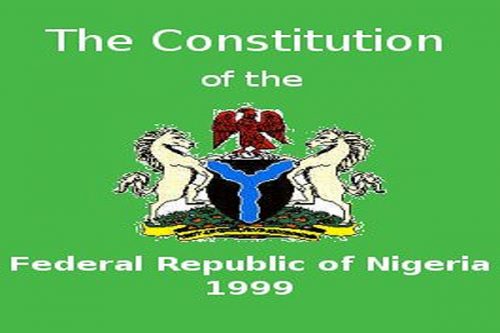
UNDERMINED by an antithetical legal framework, it is wise that some political leaders have renewed the call to scrap the 1999 Constitution for a new document. This was the theme on Monday at a colloquium organised by The Patriots in Lagos, entitled, ‘National Dialogue on the Future of Nigeria.’ Amidst the slow progress, shabby infrastructure, pervasive insecurity and mounting economic woes, Nigeria is on a journey to perdition if the call is treated with the usual levity.
Emeka Anyaoku, a former Commonwealth Secretary-General, is on point again. Harping on the need to scrap the 1999 Constitution, he pointed out that the options before Nigeria could make or mar it. “The fact from across the world is that some pluralistic nations have succeeded in becoming nations while other pluralistic countries have failed and disintegrated. The lesson from this is that pluralistic countries, which have succeeded in becoming nations, have generally practised true federalism with considerable powers devolved to the federating units.”
Already, the 10th National Assembly has embarked on another jamboree to amend the constitution. It is not only financially draining, but also an exercise in futility. The previous assemblies had toed a similar path to nowhere.
Out of the morass, Babajide Sanwo-Olu, the host governor, hit the nail on the head, saying the major problem is that politicians promise to change the constitution when they are campaigning for office. On getting there, they abandon such ideals. He should be taken seriously. Out of office, Olusegun Obasanjo, Goodluck Jonathan and some ex-governors are now converts to true federalism.
A natural federation, Nigeria is inhibited on many fronts by the 1999 Constitution, hastily imposed on it by the military junta led by Abdulsalami Abubakar when it exited governance in 1999. The major provisions are unitary in nature. It farcically centralises political power. It is an unworkable document for a country of more than 250 ethnic nationalities, and beliefs. So, instead of integration, the constitution is aiding mutual suspicion and disintegration of the country.
The most damaging provisions sees 68 items on the Exclusive Legislative List, including a single federal police force. This has precipitated anarchy: mass kidnapping, banditry, Islamic terrorism, robbery, oil militancy/theft and Fulani herdsmen rapine are the order of the day. In the previous dispensation, violence claimed 63,111 citizens under Muhammadu Buhari. In the past month, the trend has become alarming, as 16 troops were massacred in Delta State on March 14.
Common sense prevails in other pluralistic states in the form of devolved policing. Germany has three federal police forces and each of the 16 Länder (states) has its own police force. Apart from the FBI (federal), there are 17,985 police forces in the United States. Australia, Belgium, Brazil, Canada, Sweden, and Switzerland operate devolved policing.
Unlike the 1963 Republican Constitution in which the regions retained 50 per cent of their income and sent the rest to the centre, it has no provision for fiscal federalism. Divisively, it places a premium on sharing what the states produce.
The outcome? Out of 177 countries, the Fund for Peace ranks Nigeria as the 15th most fragile state in 2023 with 98.00 index points. The global average in 2023 was 65.3 index points.
Reliant on revenue sharing, the states have become indolent and unproductive. A survey by Economic Confidential said only seven out of the 36 states are viable without the monthly federal allocations. Despite this, some are still agitating for the creation of more states.
Therefore, instead of wasting time and money on the divisive and self-serving constitution amendments, the NASS, the 36 governors and President Bola Tinubu should convoke a people’s assembly and give Nigeria a truly federal constitution before it breaks up.









